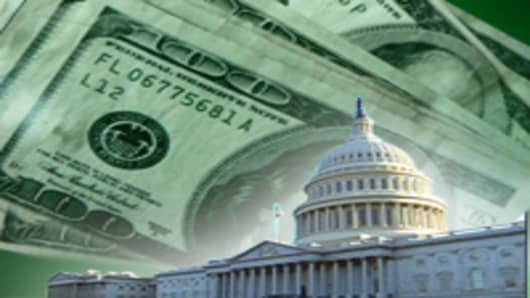Some $20 billion in new bank taxes and fees that were added to the financial reform bill at the last minute could end up sinking the entire legislation.
The new bank taxes, officially known as the "Financial Crisis Special Assessment," would be charged to financial firms in order to pay for many of the costs to the government from other provisions of the bill. Exactly how it is assessed is left to regulatory discretion—a move some critics believe would be disastrous.
The taxes were added early Friday as House-Senate conferees wrapped up a marathon session to complete the measure, which still must get final approval by both the House and the Senate. The House vote is assured, but the Senate vote has been thrown into doubt by several factors.
The death Monday of Sen. Robert Byrdmeans Democrats no longer have the 60 votes needed to prevent Republicans from blocking the legislation. And with continued opposition by a few Democrats who complain the bill doesn’t go far enough, the bill cannot afford to lose even more votes. Late Monday, for instance, Senator Russ Feingold (D-Wis.) said he wouldn't change his opposition to the bill.
In addition, Sen. Scott Brown (R-Mass.), one of only three Republicans who supported the financial reform bill, has signaled that the bank tax may cost his vote. He is worried that the costs of the new fees will be passed on to bank customers.
It is still possible that the bank assessment fee will come out of the bill. Sen. Brown’s opposition may have the same game-changing effect on financial reform as it did on the health care debate. Another possibility is that the Senate vote is delayed until a successor to Sen. Byrd is named.
Under the new provisions added to the bill, regulators—specifically the newly created Council for Financial Stability—will be empowered to apply the tax according to a "risk matrix" that contains no fewer than 13 factors. Some of these are rather straightforward, such as requiring regulators to consider the size, leverage and reliance on short term funding of a company.
But more than a few relate to goals less strictly tied to financial stability. One of the factors to be considered is a company's importance as "a source of credit for low-income, minority or underserved communities." Another tells regulators to consider whether the company is an important source of credit for state and local governments.
The bill does not tell regulators exactly how to apply these factors. It could be that banks that do a lot of lending for low-income communities would be assessed a higher fee, since the failure of those banks would be more likely to result in a bailout by government officials concerned that low-income communities would be deprived of important sources of credit.
But that does not seem likely. Far more likely is that banks that lend in ways approved by the regulators—buying municipal bonds from budget-challenged states or lending to politically favored businesses—will be assessed a lower fee. They will be given credit—rather than penalized—for being an "important source of credit" for these constituencies.
"It is unlike most tax provisions, which are fairly details and concrete. This gives a broad grant of discretionary assessment authority to the Council," says William Sweet, the head of the financial services regulatory practice at the law firm Skadden Arps Slate Meagher & Flom.
Sweet says that one of the hazards of giving regulators so much discretion is the uncertainty it creates.
"People have to plan for their businesses now despite not knowing how they’ll be taxed. This can create a kind of paralysis," Sweet says. (Update: Sweet has asked CNBC to make it clear that he does not think the bank tax will derail the bill.)
Another hazard hidden in the fee is that banking may become more politicized, as bankers adopt their businesses to meet the demands of regulators and reduce their assessments.
"If we seek the sources of a systemic failure, a logical place to look is among the legal rules that govern the system as a whole. Unfortunately, being legal mandates, these rules—unlike the different strategies pursued by competing capitalists—aren't subjected to a competitive process. So if they are based on mistaken ideas, we all suffer the consequences," Jeffrey Friedman, the editor of the forthcoming book What Caused The Financial Crisis, writes at his blog.
Friedman's book argues that the politicalization of banking was one of the primary causes of the financial crisis. When individual financial companies make mistakes about lending or investment strategy, the market can correct relatively easily. Mistakes only grown into a crisis when everyone—or nearly everyone—makes the same mistakes at the same time. And the best way to ensure this happens is through regulation, which by its very nature encourages homogenous behavior.
So in the run up to the last crisis, the government pushed hard for expanded home-ownership, pushed down interest rates, lowered lending standards and put in place bank capital rules that strongly encouraged banks to engorge themselves on mortgage backed securities. Most of the biggest and most sophisticated financial institutions followed the government's lead.



